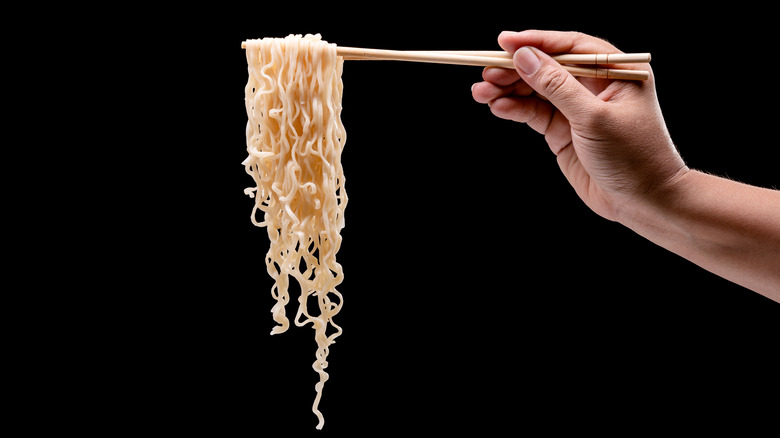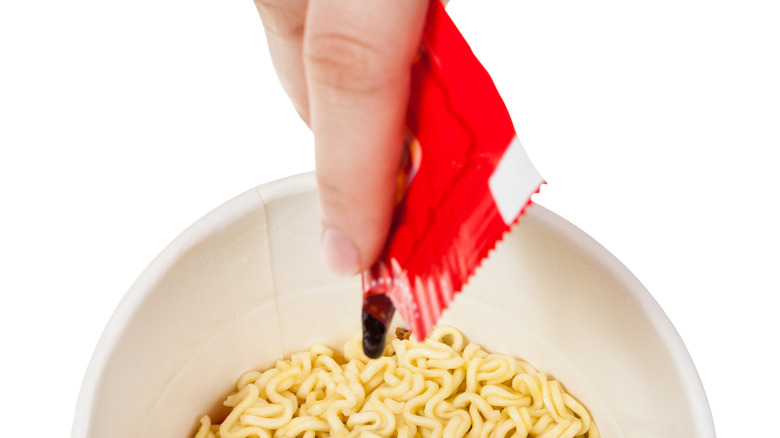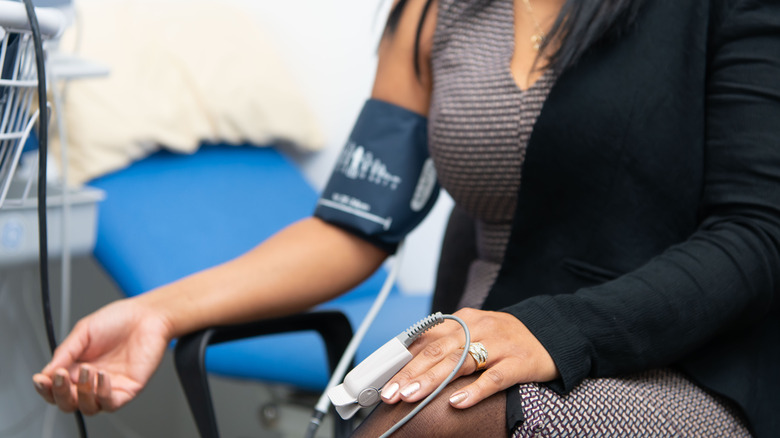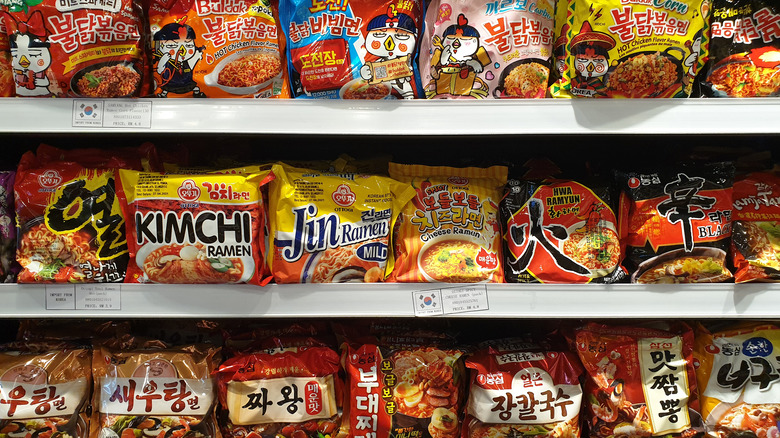When You Eat Instant Ramen Every Day This Is What Happens To You
Instant ramen is convenient, inexpensive, and delicious. This trifecta must make it the perfect food, right? Well, not exactly. The unfortunate reality is that instant ramen's processed ingredients, high sodium levels, saturated fats, and potentially dangerous additives may contribute to a range of serious health conditions (via Keck Medicine).
If you're not already familiar with the blissful simplicity of instant ramen, all you need to do is boil two cups of water, gently drop in the noodles, cook for three minutes, and stir in a seasoning packet (via HEB). Depending on how particular you are, you can chose an easier cooking option like the microwave, or a more complicated one; Epicurious recommends adding seasonings to boiling water before the noodles, then slowing down the cooking process by removing the noodles from the broth after only two minutes and fanning.
No matter how you choose to prepare your ramen, you should be aware that "Instant noodles are steeped in more than just hot water and seasoning. They're also steeped in historical and cultural significance" (via The New York Times). Originally developed back in 1958 to help curb world hunger, an overwhelming 106.4 billion servings of instant ramen were eaten across the globe in 2019. Along with being easy to make and conveniently shelf-stable, a package of instant ramen costs an average of only 25 to 45 cents (via How Much Is It?). But can this savory food be part of a healthy diet? Below, we explore what happens to you when you eat instant ramen every day.
Eating instant ramen every day may lead to metabolic syndrome
Metabolic syndrome is a medical term used to describe a combination of several health conditions (per the Mayo Clinic). Together, they increase your risk of heart attack, stroke, and type 2 diabetes. The involved conditions include elevated blood pressure, high blood sugar levels, excess body fat around the waist, and abnormal cholesterol or triglyceride levels. As many as one-third of adults in the United States have metabolic syndrome.
So what does instant ramen have to do with it? According to Keck Medicine of University of Southern California (USC), "Doctors think that ramen's processed ingredients, high sodium levels and considerable amount of saturated fats contribute to high blood pressure, high blood sugar levels, and an increased risk of stroke, diabetes and heart disease." Plus, women may want to be particularly wary of slurping down noodles daily. Even when otherwise healthy and active, women who eat instant ramen two or more times a week may be 68% more likely to develop metabolic syndrome.
Young adults, including college students, are also considered at risk. Dorm dwellers tend to be big fans of instant ramen. A 2017 study published in Nutrition Research and Practice explored the effects of overeating instant noodles on cardiometabolic function in South Korean college students, aged 18 to 29. Researchers concluded that there was indeed a link between individuals who ate instant noodles more often and signs of metabolic syndrome, such as increased plasma triglyceride levels, diastolic blood pressure, and fasting blood glucose levels.
You are eating daily sodium bombs
While it is considered an essential nutrient, eating too much sodium can be harmful to your health according to the Centers for Disease Control and Prevention (CDC). Primarily, excess sodium impacts blood pressure, leading to hypertension and increasing your risks for developing dangerous health issues like heart attack and stroke. If you think that simply putting away your salt shaker will resolve the problem, we have bad news. Sodium is often found in unexpected places; you may be surprised to learn that processed and restaurant foods account for 70% of sodium consumed.
The average amount of sodium eaten by adults in the U.S. is 3,400 mg per day. The US Food and Drug Administration (FDA) recommends limiting your sodium intake to 2,300 mg per day, or the equivalent of one teaspoon of table salt. But here's the thing: Eating instant ramen (and other highly processed foods) makes this challenging. According to Healthline, a single package of instant ramen contains 1,760 mg of sodium, which equates to over 75% of the FDA's recommended daily limit.
We understand that instant ramen offers that oh-so-salty, soul-nourishing yumminess, and we hate to take this away from you. However, not eating instant ramen every day is one tool that can help keep your sodium intake in check. In general, the CDC confirms that limiting processed foods and restaurant foods can help lower blood pressure and prevent heart attack and stroke.
You may develop high blood pressure
High blood pressure, one major element of metabolic syndrome, can develop when you eat instant ramen daily (via Healthline). Dangers of high blood pressure include an increased risk for a potentially fatal heart attack or stroke, along with a diminished quality of life (via the Mayo Clinic). Damage from high blood pressure can develop slowly over time, eventually impacting your arteries, heart, brain, kidneys, and eyes. Or, blood pressure can also rise suddenly, leading to memory loss, blindness, loss of kidney function, chest pain, pulmonary edema, heart attack, and stroke.
Lifestyle modifications, including not eating instant ramen every day, may help lower your blood pressure and reduce your risks for dangerous health issues. The Mayo Clinic recommends managing your weight and waistline, exercising regularly, eating a healthy diet, reducing sodium intake, limiting alcohol, quitting smoking, cutting back on caffeine, reducing stress, monitoring your blood pressure at home, visiting your doctor regularly, and drawing on friends and family for support to improve your health. If you need help making lifestyle changes, talk to your doctor. They can provide resources to set you up for success, such as referring you to medical weight loss specialists or smoking cessation programs.
You may gain weight
There are several reasons why eating instant ramen every day may lead to weight gain. Although the calories listed on the package may not seem alarming at first, people may not realize that they are eating more than one serving. A standard package usually equals two servings, with somewhere around 380 total calories depending on brand and flavor (via Verywell Fit). Keep in mind that the amount of daily calories that your body actually requires varies based on weight, and activity level. For specific recommendations, WebMD provides a helpful table of estimated calorie requirements.
Another problem with instant ramen and weight management is that despite eating a large bowl, you may feel hungry again soon after (per The Mighty). This can lead to you eating more calories overall throughout the day. Why doesn't ramen fill you up? For one thing, eating so many refined carbs can lead to your blood sugar spiking and dipping, prompting you to eat more. Additionally, instant ramen is low in fiber and protein, two important dietary elements that help to keep you from feeling hungry. Fiber and protein can help people lose excess weight or maintain a healthy body mass index (BMI) over time. And while instant ramen falls short in these areas, it has plenty of saturated fats. Of course, that isn't a good thing for your waistline, either. Lastly, eating instant ramen often leads to water retention and bloating due to the high sodium content, which can also affect the bottom line number on your scale.
Eating instant ramen every day can lead to liver damage
Along with increasing your risk for metabolic syndrome, weight gain, and heart failure, everyone's favorite noodles can also lead to liver damage. MDLinx lists instant ramen as one of seven foods to "avoid at all costs," in part due to some of its questionable ingredients — especially preservatives — that your liver must struggle to break down. Other unhealthy foods that you should plan to avoid include processed deli meats, donuts, movie theater popcorn, raw oysters, sugar-sweetened fruit juices, and reduced fat peanut butter.
Over time, behaviors and health conditions that damage the liver can lead to cirrhosis (scarring), which can cause liver failure (via Mayo Clinic). Although noticeable symptoms do not always develop, possible signs of liver disease include yellowish eyes and skin (jaundice), abdominal pain and swelling, swollen legs and ankles, itchiness, dark urine, pale stool, nausea and vomiting, loss of appetite, and chronic fatigue. If you are concerned about the health of your liver, talk to your doctor. And don't eat instant ramen every day.
You may experience digestive issues
Does your digestion get off track after eating instant ramen? Dr. Branden Kuo of Massachusetts General Hospital conducted research to see what happened in the digestive tract after eating fresh versus instant ramen noodles (via Lifehack). Using a pill camera (one that can be swallowed), he found that the instant noodles were still intact after two hours. On the other hand, the fresh noodles appeared to be almost completely digested. He continued to record for 32 hours, explaining that his research showed the stomach contracting back and forth to grind up the instant noodles. In itself, this may or may not be a big deal. According to Canada's McGill Office for Science and Society, Dr. Kuo is not particularly bothered by this information and continues to eat processed noodles himself on occasion. Larger-scale studies are needed to further evaluate Dr. Kuo's research.
Alongside a bellyful of slowly digesting noodles, you may develop uncomfortable bloating due to fluid retention (per Medical News Today). Fluid retention tends to develop after a person eats large amounts of sodium (i.e. upwards of the 1,700 mg in a single package of instant ramen), or any time there is a problem with the body regulating proper fluid levels. What happens is that the body overcompensates for the fluid imbalance by retaining more water, leading to temporary water weight gain. The condition can leave you feeling swollen and lethargic (via Yahoo!).
Eating instant ramen can cause nutritional deficiencies
If you're filling up on instant ramen every day, you may be depriving your body of essential nutrients required for it to properly function. Perhaps most importantly, instant ramen is lacking in two key nutritional areas that are important for your well-being: fiber and protein (per The Mighty).
Getting enough dietary fiber can regulate bowel movements, help with weight management, and lower your risk for heart disease, diabetes, and some types of cancer (per the Mayo Clinic). It can even help you live longer. Women should aim to consume at least 25 g (age 50 or younger) or 21 g (over age 50) of fiber daily; men should aim for 38 g or 30 g, accordingly. High-fiber foods include fresh fruits and vegetables, whole grains, and legumes.
According to MedlinePlus, eating enough protein can benefit your health on a cellular level. It does this by helping your body repair its cells, along with creating new ones — so it's not surprising that protein is vital for growth and development, particularly for kids and adolescents, and pregnant women. Among other issues, if your body does not get enough protein then tissues begin to break down and you may experience muscle loss (via WebMD). That said, it is important to understand that eating too much protein can also be harmful. Women should try to eat 46 g of protein daily; men, 56 g.
Vision disturbances and headaches may be triggered
Have you ever noticed eye trouble after slurping down your daily bowl of instant ramen? Although a less common side effect, this may be due to consumption of tertiary-butylhydroquinone (TBHQ), ramen's main preservative (per Cooking Light). According to Healthline, a number of cases of vision disturbances due to TBHQ have been reported to the National Library of Medicine.
Healthline also shares that some individuals who eat salty processed foods (such as instant ramen) may experience headaches. This is likely because high amounts of sodium increase blood pressure, and elevated blood pressure, which in turn can cause headaches and migraines. Another common ingredient in instant ramen, monosodium glutamate (MSG), is also a well-known migraine trigger (via Verywell Health). If you notice vision changes or headaches after eating instant ramen, this is probably a sign that you should avoid it. Hopefully, cutting back on highly processed foods will alleviate your symptoms. We also recommend talking to your doctor to rule out potentially serious underlying conditions.
It may (or may not) increase your tumor risk
Truthfully, this one is a little confusing. The Center for Science in the Public Interest (CSPI) places tertiary-butylhydroquinone (TBHQ), a preservative common in ramen (per Cooking Light), on their list of substances to avoid. They also remark, "In a government study which used a better design than other similar studies, TBHQ increased the incidence of tumors in rats." On the other hand, while CSPI's recommendation to avoid TBHQ may bring up concerns about a link between instant ramen and cancer, a food additive safety evaluation drafted back in 1998 by the World Health Organization deemed TBHQ as non-carcinogenic, at least to mice and rats. They determined that dogs may be more susceptible to any potentially carcinogenic effects of TBHQ.
A 2007 review published in Current Drug Metabolism comments on the lack of evidence that TBHQ may cause tumors. In fact, researchers say that quite the opposite may be true: "Extensive studies have demonstrated that TBHQ exhibit anti-carcinogenic effect." Perhaps this has to do with TBHQ being an antioxidant, a type of chemical that some believe helps prevent cancer (via the National Cancer Institute). What should we make of these apparently conflicting viewpoints? Seems like the jury is still out.
You may be harming your immune system
These days, we've all been thinking a lot about the immune system. And as it turns out, if you eat instant ramen every day, you may not be doing any favors for your systems of bodily protection. One problem is instant ramen's content of TBHQ — a preservative in many processed foods which serves no function other than extending shelf life. A 2021 study published in the International Journal of Environmental Research and Public Health examined the effect of TBHQ on the immune system's cell proteins. They discovered that "TBHQ affected immune cell proteins at doses similar to those that cause harm in traditional studies." In other words, consuming too much TBHQ can indeed cause problems. The study also observed that earlier studies show how TBHQ may decrease the effectiveness of flu vaccines.
Researchers are also investigating possible connections between TBHQ and food allergies: In 2016, Food Business News reported on a $1.5 million 5-year grant to Cheryl Rockwell, an assistant professor of pharmacology and toxicology in the College of Human Medicine at Michigan State University, for further research to confirm a possible link between TBHQ and a rise in food allergies. According to her previous research, the preservative may prompt the immune system to release proteins that cause food allergies to develop.
Eating instant ramen may impact your behavior:
Instant ramen's most notorious preservative, TBHQ, may also be linked to an increase in symptoms of attention deficit hyperactivity disorder (ADHD). Proponents of the Feingold Diet, a dietary plan designed to help kids manage symptoms of ADHD and other learning disorders, believe that eating certain foods can make ADHD symptoms worse and should be restricted (via WebMD). The Feingold Diet was developed in the 1970s by pediatrician and allergist Benjamin Feingold, and its dietary recommendations include avoiding food preservatives BHA, BHT, and TBHQ, along with salicylates and artificial food colors, dyes, flavors, fragrances, and sweeteners.
Unfortunately, the Feingold Diet may not be effective for everyone with behavioral issues. According to WebMD, the diet may be most beneficial to kids with genetic sensitivities to the off-limit substances. Some medical experts also believe that eliminating artificial food additives can alleviate symptoms of autism, while cutting back on processed foods and added sugars can reduce the risk of depression in kids and teens. In other words, ditching a daily instant ramen habit may positively impact behavior, along with improving broader mental health issues.
You can still enjoy instant ramen occasionally, just not every day
We get it: Sometimes you just need something quick, easy, and soothing. Plus, you may not always have the time or energy to scrutinize a food's ingredient list. The good news is that while you shouldn't eat instant ramen every day, most people can indulge an occasional craving without causing any major health damage.
If you feel the need to eat ramen, we have some suggestions on how to make your noodles a little healthier. First of all, consider using only half of the flavoring packet, which will drastically reduce the amount of sodium consumed (per The Healthy). Better yet, NBC News suggests making your own ramen. You can purchase refrigerated noodle varieties (preferably whole wheat) and prepare them with low-sodium broth, lean proteins, and layers of vegetables. If you're concerned about your waistline, keep the noodle serving to half a cup.
Some foodies do not consider instant ramen to be real ramen at all, since ramen is usually prepared with fresh ingredients like hand-pulled wheat noodles, chicken or pork stock, and toppings like scallions, bamboo shoot, and barbecue pork. When prepared in this way, fresh ramen can deliver all of the umami you love without the negative health consequences. Enjoy!












